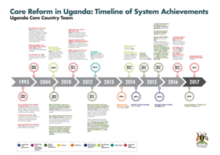Demographic Data
|
Sources: World Bank, UNICEF, UNDP HDR 2015, DHS 2011 |
Displaying 9101 - 9110 of 14391
This infographic provides a historical timeline of the alternative care reform process in Uganda, marking key achievements in the establishment of policies, guidelines, procedures, and programs to improve the quality of care and protection for children without adequate family care.
The foster care "hackathon" series explores how technology can be optimized to streamline child welfare systems and improve series to young people in care and their families.
This paper investigates young care leavers' expectations of their future after discharge from care.
This presentation delivered by Dr. Kristen Cheney describes her research findings on the "Orphan Industrial Complex," which suggest that orphan tourism, orphanage volunteering, and donor support for orphanages are the primary drivers of the unnecessary separation of children from their families and the harmful institutionalization of children.
This report explores the challenges of implementing and evaluating relationship-based interventions for young people with experience in the U.S. foster care system and presents recommendations for both practitioners and researchers for successful implementation and evaluation in the future.
New research indicates that almost half of England’s 26,340 care leavers are suffering from at least one mental health issue, and 65% of them are not getting help from the government.
This week the Cambodian government released an explanatory note to educate the public on domestic adoption; however, some express concern whether bolstering domestic adoptions is currently feasible or safe for children.
In this seminar, Dr. Kristen Cheney will explain the concept of the orphan industrial complex: how it works and what its consequences are for children, families, and child protection systems.
This essay examines the extreme violence and organized crime in the Central American Northern Triangle (CANT) region that is causing many young people, families, and individuals to flee and become displaced, as well as the widespread forcible gang recruitment in the region.
This study investigated Portuguese adolescent adoptees' perceptions of their attachment relationships with their adopted parents compared to adolescents living with biological parents and adolescents living in residential care.



